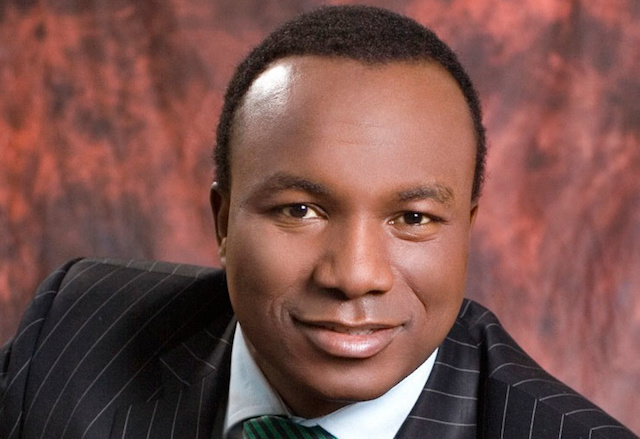The Federal High Court, Abuja, dismissed, on Monday, a N1 billion fundamental rights enforcement suit brought by Nnamdi Kanu, the detained leader of the proscribed Indigenous People of Biafra (IPOB).
Mr Kanu filed the suit alleging that the State Security Service (SSS), which has held him in custody since June 2021, undermined his defence regarding his ongoing trial before the Federal High Court.
However, delivering judgement on the matter, the judge, James Omotosho, ruled on Monday that Mr Kanu failed to substantiate his allegations and violations of his rights for which he sought N1 billion compensation.
The judgement comes less than two weeks after Mr Kanu declared his intention to negotiate with the Nigerian government to drop the treasonable felony charges against him.
The SSS is holding Mr Kanu, a dual citizen of Nigeria and the United Kingdom, over charges of treasonable felony arising from his separatist campaigns for the secession of independent Biafra from Nigeria.
His trial started in 2015 and stalled after he fled the country on being granted bail in 2017.
He was re-arrested in Kenya in June 2021 to continue his trial. The trial judge, Binta Nyako of the Federal High Court in Abuja, ordered his remand in SSS custody throughout his trial.
Nigerians need credible journalism. Help us report it.
PREMIUM TIMES delivers fact-based journalism for Nigerians, by Nigerians — and our community of supporters, the readers who donate, make our work possible. Help us bring you and millions of others in-depth, meticulously researched news and information.
It’s essential to acknowledge that news production incurs expenses, and we take pride in never placing our stories behind a prohibitive paywall.
Will you support our newsroom with a modest donation to help maintain our commitment to free, accessible news?
Kanu’s grievances in N1 billion suit
However, on 4 December 2023, the IPOB leader filed a fundamental rights enforcement suit before another judge of the Federal High Court in Abuja, Mr Omotosho, accusing SSS operatives of hindering his preparation for his defence in custody.
Mr Kanu, whose bail applications have been repeatedly turned down by the trial court, accused SSS operatives of eavesdropping on the discussions of his defence with his lawyers.
He also accused the SSS operatives of preventing his lawyers from taking notes while meeting with him, sometimes outrightly preventing them from meeting him.
According to him, the SSS operatives also seized and photocopied sensitive documents meant for his defence.
He said these actions impaired his defence for his ongoing trial and amounted to violating his rights.
‘No evidence’
However, the trial judge, Mr Omotosho, ruled in his judgement on Monday that Mr Kanu failed to provide credible evidence to back the alleged violation of his fundamental rights.
Mr Omotosho held that Mr Kanu failed to substantiate with evidence his claims that SSS operatives denied him unhindered access to his lawyers.
He also ruled that the plaintiff failed to prove his claim that SSS officials eavesdropped on his conversations with his lawyers in preparation for his defence.
Kanu’s suit, prayers
The News Agency of Nigeria (NAN) reports that the IPOB leader, through his lawyer, Aloy Ejimakor, had sued the Federal Republic of Nigeria (FRN), the Attorney-General of the Federation (AGF), the SSS and its director-general as 1st to 4th respondents, respectively.
He sought “a declaration that the respondents’ act of forcible seizure and photocopying of confidential legal documents pertaining to facilitating the preparation of his defence, which were brought to him at the respondents’ detention facility by his lawyers, amounted to a denial of his rights to be defended by legal practitioners of his own choice.
He also sought “a declaration that the respondents’ act of refusing or preventing his counsel from taking notes of details of counsel’s professional discussions/consultations with him at SSS detention, with said discussions/consultations relating to the preparation of his defence amounted to a denial of his right to be given adequate facilities for the preparation of his defence by legal practitioners of his own choice.
“A declaration that the respondents’ act of eavesdropping on his confidential consultations/conversations with his lawyers on matters relating to the preparation of his defence during the lawyers’ visitations amounted to a denial of the applicant’s right to be given adequate facilities for the preparation of his defence and to be. defended by legal practitioners of his own choice.”
He described the acts as illegal, unlawful, unconstitutional and constituted an infringement of his fundamental right to fair hearing as enshrined and guaranteed under Section 36(6)(b) & (c) of the 1999 Constitution (as amended) and Article 7(1)(c) of the African Charter on Human and Peoples Rights.
Mr Kanu, therefore, sought an order of injunction restraining and prohibiting the respondents from their act of forcible seizure and photocopying of confidential legal documents brought to him at the detention facility by his lawyers.
“An order of injunction restraining and prohibiting the respondents from their act of refusing or preventing the applicant’s counsel from taking notes of details of counsel’s professional discussions/consultations with the applicant during the counsel’s visitation with the applicant at the premises of respondents’ detention facility.
“An order of injunction restraining and prohibiting the respondents from their act of eavesdropping on the applicant’s confidential consultations/conversations with his lawyers on matters relating to the preparation of the applicant’s defence during the lawyers’ visitations with the applicant at the detention facility.”
Mr Kanu sought an order compelling the respondents to issue an official letter of apology to him for the infringement of his fundamental right to a fair hearing.
He also sought an order mandating the respondents to jointly and severally pay the sum of N1 billion as damages for the mental, emotional, psychological and other damages he suffered as a result of his rights’ breach.
The trial of Mr Kanu on charges of treasonable felony recently resumed before another judge of the Federal High Court in Abuja, Bintang Nyako, following a Supreme Court order.
SSS’ opposition
However, the SSS denied Mr Kanu’s allegations and claims in a counter-affidavit filed on 12 March.
Yamuje Benye, a staff member of the SSS legal department who deposed to the counter-affidavit, pointed out 11 paragraphs that he claimed were untrue in Mr Kanu’s affidavit.
He averred that Mr Kanu was in safe and secure SSS custody and not detained in solitary confinement.
According to Mr Benye, the applicant (Kanu) was allowed access to his family members and team of lawyers on his visiting days without any hindrance whatsoever.
He said the IPOB leader was permitted to interact and consult with his lawyers on his visiting days without any interference.
He said at no time did any SSS personnel seize or confiscate documents brought to Mr Kanu by his lawyers or any other person.
He added that SSS personnel never denied Mr Kanu’s lawyers the professional liberty to perform their lawful duty of discussing, consulting and interacting with him.
“Applicant’s lawyers are allowed to moderate size notes or pads for the visit, but the exchange of materials that promotes the IPOB ideals (subject matter of applicant’s criminal trial) were strongly resisted and refused.
“Applicant has consistently requested that various prayer books and religious materials be brought to him as part of his fundamental human right,” the deponent wrote.
Mr Benye also said another judge of the Federal High Court in Abuja overseeing Mr Kanu’s trial, Binta Nyako, had always maintained that visits to him should always be under supervision in line with best practices all over the world.
According to him, the applicant (Kanu), along with his counsel, was permitted to consult and interact on visiting days in one of the best interview facilities of the SSS to ensure maximum comfort of the applicant and his visitor(s).
The official, who denied allegations that the personnel usually record their interaction during visits, said “there is no basis for eavesdropping and recording of their conversations.”
He said that in line with the Service Standard Operation Procedure (SOP) of SSS, all visitors to her facility were subjected to regular routine security checks and that items in their possession were scanned.
According to him, the measure was put in place to prevent unauthorised materials from making their way into the facility.
He said Mr Kanu had argued the same issues before the judge handling his trial, Nyako, and the matter was already reserved for judgment.
Mr Benye, therefore, urged the court to dismiss the instant suit because it constituted an abuse of the court process.
The Federal Republic of Nigeria and the AGF similarly urged the court to dismiss the suit for being an abuse of court process.
(NAN)
Support PREMIUM TIMES' journalism of integrity and credibility
At Premium Times, we firmly believe in the importance of high-quality journalism. Recognizing that not everyone can afford costly news subscriptions, we are dedicated to delivering meticulously researched, fact-checked news that remains freely accessible to all.
Whether you turn to Premium Times for daily updates, in-depth investigations into pressing national issues, or entertaining trending stories, we value your readership.
It’s essential to acknowledge that news production incurs expenses, and we take pride in never placing our stories behind a prohibitive paywall.
Would you consider supporting us with a modest contribution on a monthly basis to help maintain our commitment to free, accessible news?
TEXT AD: Call Willie - +2348098788999

















 English (US) ·
English (US) ·